AI for Mental Health: How Artificial Intelligence Is Revolutionizing Treatment
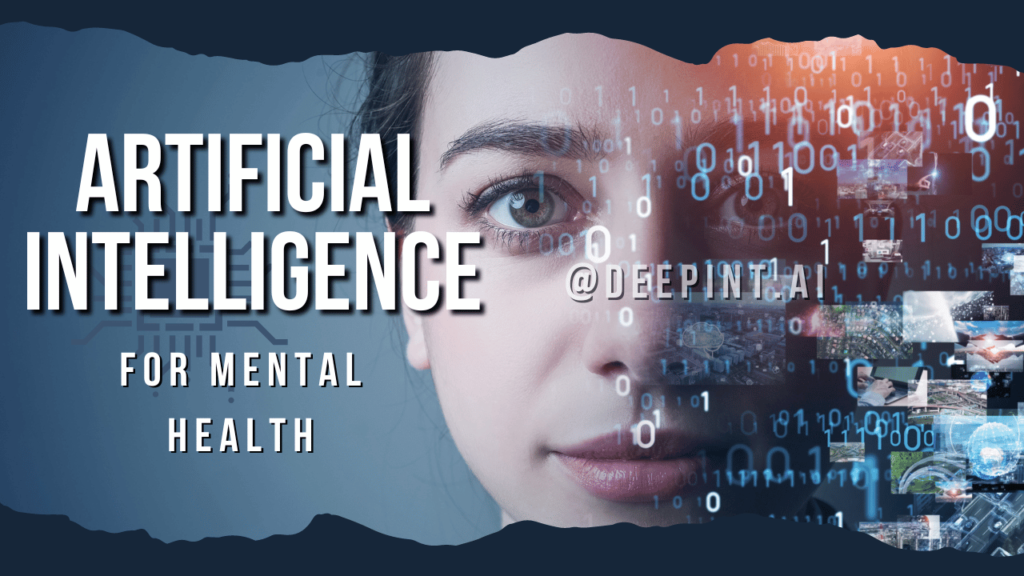
Artificial Intelligence (AI) is revolutionizing the field of mental health treatment by providing innovative solutions to long-standing challenges. From predicting the likelihood of mental health conditions to facilitating personalized treatment plans, AI has the potential to transform the way mental health professionals approach patient care.
One of the most promising applications of AI is in the field of telepsychiatry, which uses video conferencing and other digital tools to provide mental health care to patients remotely. By leveraging AI-powered virtual assistants and chatbots, patients can access mental health support and resources from the comfort of their own homes.
AI can also improve the accuracy of diagnoses by analyzing large amounts of patient data, including behavioral patterns and speech, to identify early warning signs of mental health conditions. With its ability to personalize treatment plans and provide real-time support, AI is poised to play a significant role in the future of mental health treatment.
Furthermore, AI-powered cognitive behavioral therapy (CBT) chatbots can help individuals manage symptoms of anxiety, depression, and other mental health disorders. These chatbots can offer round-the-clock support, personalized coping strategies, and even monitor mood and behavior changes over time.
AI can also assist mental health professionals in identifying potential treatment options by analyzing large amounts of data from clinical trials, research papers, and patient records. This can lead to more informed decisions about treatment plans, including personalized drug therapies, behavioral interventions, and other evidence-based treatments.
Although AI is still in the early stages of implementation in the mental health field, it holds tremendous promise for transforming the way we approach mental health treatment and care. As more research is conducted and more data is analyzed, AI is likely to become an increasingly valuable tool for mental health professionals and patients alike.
The Role of AI in Mental Health: Advancements and Opportunities
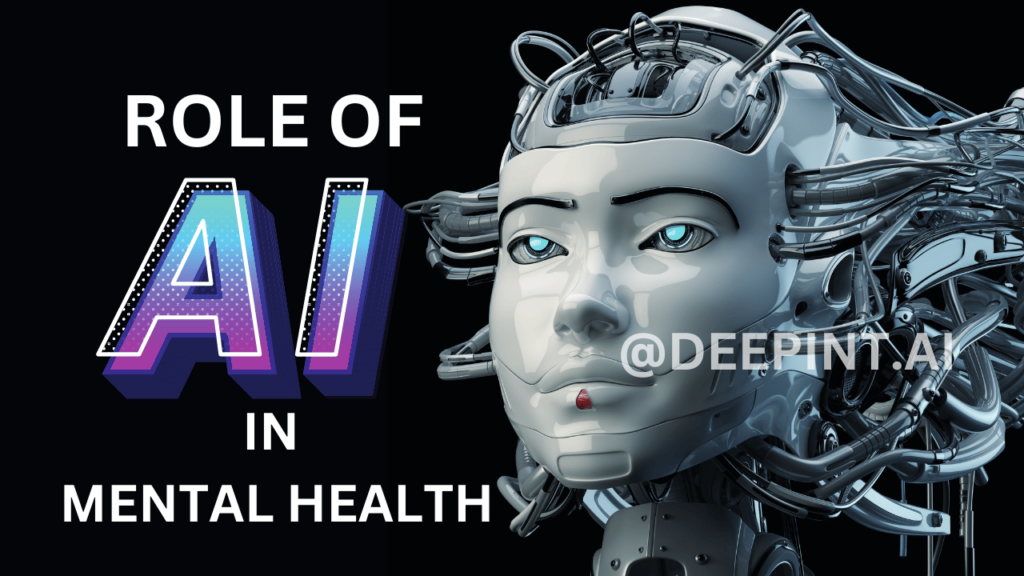
The role of Artificial Intelligence (AI) in mental health care has expanded dramatically in recent years. AI can provide personalized care that caters to the unique needs of each patient. It has the potential to identify risk factors, predict the onset of mental health disorders, and create treatment plans that are tailored to an individual’s specific needs.
AI can assist clinicians in diagnosing and treating mental health conditions by analyzing a patient’s speech patterns, facial expressions, and other behavioral markers to determine their mental state. The development of AI-powered chatbots and virtual assistants has made mental health care more accessible and affordable, which is especially important for those who live in remote or underserved areas.
AI has also enabled the development of predictive models that can alert clinicians to potential risks for suicide and self-harm, helping to prevent tragic outcomes. As AI continues to evolve, it will undoubtedly play an increasingly important role in mental health care by improving outcomes, enhancing accessibility, and increasing the accuracy of diagnoses.
Moreover, AI can assist in identifying new treatments and therapies for mental health conditions. By analyzing vast amounts of data from clinical trials and research papers, AI can help researchers identify patterns and correlations that may have been missed through traditional methods.
This could lead to the discovery of new drugs and treatments for mental health conditions that are currently difficult to treat. AI can also assist mental health professionals in predicting the effectiveness of certain treatments for individual patients based on their medical history, genetics, and other factors. By doing so, AI can help optimize treatment plans for maximum effectiveness and efficiency.
While there are still limitations to AI in mental health care, such as the potential for bias and ethical concerns, the advancements and opportunities provided by AI are truly remarkable. As AI technology continues to improve, the potential for its role in mental health care will only continue to expand.
AI-Assisted Diagnosis: The Future of Mental Health Care
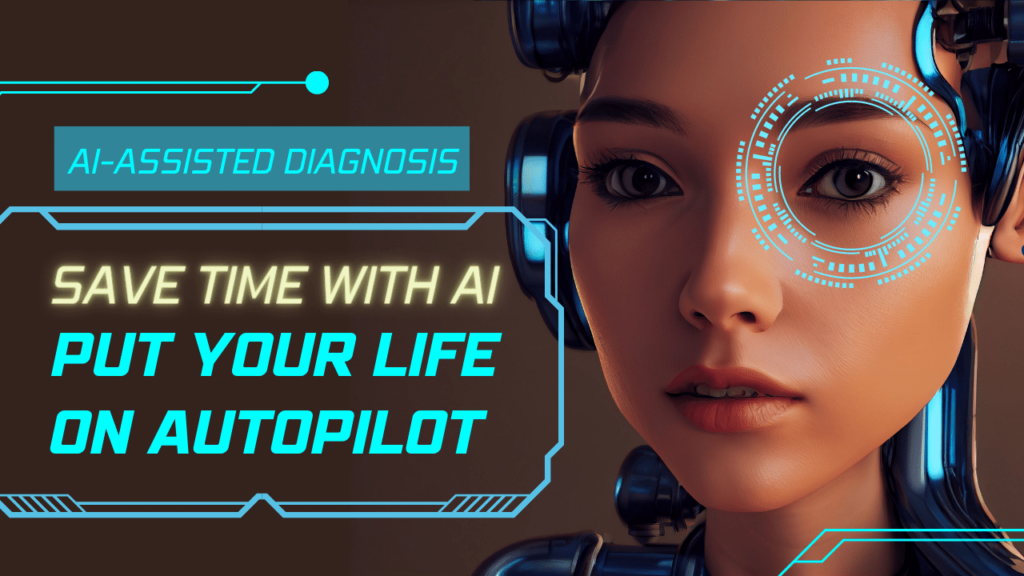
AI-assisted diagnosis is rapidly becoming a game-changer in the field of mental health care. AI technologies can assist mental health professionals in making accurate diagnoses by analyzing a patient’s behavioral patterns, speech, and other markers of mental health.
By identifying patterns and correlations that may be missed by traditional diagnostic methods, AI can help mental health professionals make more informed decisions about treatment plans and optimize the care they provide. AI can also assist in identifying potential co-occurring disorders, which can be especially important in patients with complex medical histories.
Additionally, AI can help to standardize the diagnostic process, reducing the variability in diagnoses between different clinicians. While there are still challenges to be addressed, such as ensuring the quality and reliability of the data used to train AI algorithms, the potential of AI-assisted diagnosis in mental health care is tremendous.
As AI technology continues to improve, it has the potential to transform the field of mental health care by improving accuracy and accessibility of diagnosis, and ultimately improving patient outcomes.
In addition to diagnosis, AI-assisted treatment planning is also an exciting development in the field of mental health care. By analyzing vast amounts of patient data, AI can help mental health professionals create personalized treatment plans that are tailored to the unique needs of each patient.
This can lead to more effective treatments, shorter recovery times, and better outcomes for patients. AI can also assist in monitoring patient progress, alerting clinicians to potential relapses or changes in symptoms that may require adjustment to the treatment plan.
With the help of AI-assisted treatment planning, mental health professionals can optimize their treatment strategies and provide patients with more effective care. As AI technology continues to evolve, it is likely that it will play an increasingly important role in mental health care, improving the accuracy of diagnosis, the effectiveness of treatment, and ultimately, the quality of life for patients.
The Ethics of Using AI in Mental Health Treatment: Balancing Risks and Benefits
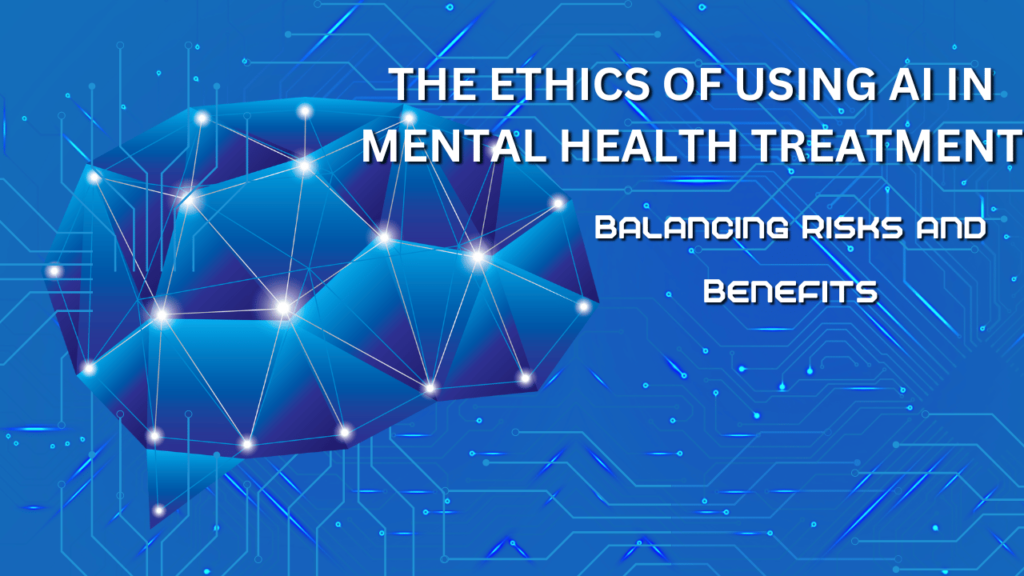
As the use of AI in mental health treatment continues to grow, it is important to consider the ethical implications of these technologies. While AI has the potential to improve the accuracy and accessibility of mental health care, it also poses risks such as perpetuating bias and privacy violations.
AI algorithms may reflect biases present in the data used to train them, leading to inaccurate diagnoses or discriminatory treatment recommendations. Additionally, the use of AI in mental health care raises important questions about data privacy and confidentiality.
Patients may be hesitant to share sensitive information with AI-powered tools if they are unsure about how their data will be used and protected. To ensure that AI is used ethically in mental health care, it is important to balance the potential benefits with the risks and implement safeguards such as data encryption, transparency in algorithm development, and ongoing monitoring for bias.
By doing so, we can harness the power of AI to improve mental health care while also protecting patient rights and privacy.
Another ethical concern related to the use of AI in mental health care is the potential for these technologies to replace human interaction and empathy. Mental health treatment often involves building a therapeutic relationship between the patient and clinician, which is essential for effective care.
While AI can provide valuable insights and analysis, it cannot replace the human touch that is crucial in mental health care. There is also a risk that patients may become overly reliant on AI-powered tools, leading to a decreased sense of personal responsibility and engagement in their treatment.
To address these concerns, mental health professionals must ensure that AI is used as a tool to enhance, rather than replace, the human elements of mental health care. This may involve finding a balance between using AI for data analysis and diagnosis while also ensuring that patients receive adequate face-to-face time with clinicians.
By using AI in conjunction with human expertise, we can optimize mental health care and provide patients with the support they need to achieve better outcomes.
Chatbots for Mental Health: How AI Is Improving Support for Those in Need
Chatbots are a growing area of focus in the field of mental health care, providing individuals with immediate access to support and resources. Using natural language processing and machine learning algorithms, chatbots can converse with users in a way that feels human, providing guidance and support for a range of mental health concerns.
Chatbots can provide a safe and private space for individuals to discuss their feelings and receive support, particularly in situations where face-to-face interaction may be difficult or uncomfortable.
Additionally, chatbots can offer round-the-clock support, providing individuals with immediate help when they need it. While chatbots are not a replacement for mental health professionals, they can complement traditional mental health care by providing an additional layer of support for individuals in need.
As AI technology continues to advance, we can expect to see more sophisticated chatbots that can provide even more personalized and effective support for mental health concerns.
However, there are also some limitations to using chatbots in mental health care. One concern is that chatbots may not be able to fully understand the nuances of human emotions and may not be able to provide the same level of empathy and support as a human mental health professional.
Additionally, chatbots may not be equipped to handle crisis situations or severe mental health concerns that require immediate intervention. To address these limitations, it is important to ensure that chatbots are developed and monitored by mental health professionals and that users are provided with clear information about the limitations of the technology.
By doing so, we can leverage the benefits of chatbots in mental health care while also ensuring that individuals receive appropriate care when needed. Overall, the use of chatbots in mental health care represents an exciting development in the field, providing individuals with new tools and resources to support their mental health and well-being.
AI-Driven Monitoring: Enhancing Mental Health Support and Treatment
AI-driven monitoring is transforming mental health care by providing clinicians with real-time data and insights into patient behavior and treatment outcomes. Through wearable devices and mobile apps, AI algorithms can monitor patients’ physical and emotional states, track medication adherence, and provide early warning signs of potential relapse.
This technology can help clinicians tailor treatment plans to individual patients, improving the effectiveness of care and reducing the risk of hospitalization or emergency intervention. AI-driven monitoring can also provide patients with greater autonomy over their treatment, allowing them to track their progress and receive personalized feedback and support.
However, the use of AI-driven monitoring also raises concerns about data privacy and the potential for technology to exacerbate existing health disparities. To ensure that AI-driven monitoring is used ethically and effectively, it is important to develop transparent and secure data management policies and to consider the potential impact on marginalized communities.
By doing so, we can harness the power of AI to enhance mental health care and support the well-being of individuals living with mental illness.
As with any new technology, there are also limitations and challenges associated with AI-driven monitoring. For example, there is a risk that patients may become overly reliant on technology, leading to decreased engagement in their treatment and a lack of communication with their healthcare provider.
Additionally, there may be concerns around the accuracy and reliability of AI algorithms, particularly in cases where there is limited data available on certain patient populations. To address these challenges, it is important to integrate AI-driven monitoring into a broader mental health care plan that incorporates human expertise and intervention when necessary.
Mental health professionals should also prioritize open communication with patients about the role of technology in their treatment and provide adequate support to ensure that patients are engaged and informed about their care. By using AI-driven monitoring in conjunction with traditional mental health care practices, we can optimize treatment outcomes and provide patients with the support they need to achieve better mental health and well-being.
AI and Mental Health Research: Emerging Trends and Limitations
AI is increasingly being used in mental health research to uncover new insights and potential treatments for mental illness. Machine learning algorithms can analyze vast amounts of data from various sources, including electronic health records and brain imaging scans, to identify patterns and correlations that may not be apparent to human researchers.
AI can also help identify subgroups of patients with similar characteristics or treatment responses, leading to more personalized and effective treatment plans. However, there are also limitations to using AI in mental health research.
For example, the quality and quantity of data available for analysis can vary widely, leading to potential biases and inaccurate conclusions. Additionally, ethical concerns around data privacy and ownership can arise when using AI in research. It is important to ensure that AI research is conducted in an ethical and transparent manner, with clear guidelines around data use and patient privacy.
By addressing these limitations and leveraging the power of AI, we can unlock new insights and approaches to understanding and treating mental illness.
One emerging trend in AI and mental health research is the use of natural language processing (NLP) to analyze written and spoken language. NLP can identify patterns in language that may be indicative of mental health concerns, such as changes in tone or use of certain words.
This technology can be used to develop more accurate diagnostic tools and to monitor changes in patients’ mental health over time. Another trend is the use of AI in developing digital therapeutics, such as smartphone apps and virtual reality platforms, that can deliver evidence-based interventions for mental health concerns.
These digital therapeutics can provide individuals with greater access to mental health care and support, particularly in underserved or remote communities.
Despite these promising developments, there are still challenges to be addressed in AI and mental health research. One major challenge is the need for diverse and representative data sets, as many AI algorithms have been developed on data sets that are not representative of the entire population.
This can lead to biases and inaccuracies in AI models and limit the effectiveness of AI-driven mental health care. Additionally, there is a need for greater collaboration between mental health professionals and AI researchers to ensure that AI is developed and deployed in an ethical and responsible manner.
By addressing these challenges and fostering collaboration between different stakeholders, we can continue to push the boundaries of AI and mental health research and ultimately improve the lives of individuals living with mental illness.
The Effectiveness of AI-Based Interventions for Mental Health: A Comprehensive Review
AI-based interventions for mental health have shown promise in improving access to care and delivering personalized treatment plans. However, there is still much to be learned about the effectiveness of these interventions.
A comprehensive review of existing research has found that AI-based interventions can be effective in improving symptoms of depression, anxiety, and PTSD, among other conditions. One study found that a chatbot-based intervention was effective in reducing symptoms of depression and anxiety in a group of young adults.
Another study found that an AI-driven mobile app was effective in predicting suicide risk and providing timely interventions to prevent suicide. While these findings are promising, it is important to note that many AI-based interventions are still in the early stages of development and more research is needed to validate their effectiveness.
It is also important to consider the potential limitations and ethical concerns associated with using AI in mental health care. By continuing to study and evaluate the effectiveness of AI-based interventions for mental health, we can improve access to care and deliver more effective treatment options for individuals living with mental illness.
One challenge in evaluating the effectiveness of AI-based interventions for mental health is the need for more rigorous and standardized research methodologies. Many studies to date have been small-scale and focused on specific populations or conditions, making it difficult to generalize their findings to a wider population.
Additionally, there is a need for more randomized controlled trials to compare the effectiveness of AI-based interventions to traditional forms of mental health care. Furthermore, there is a need to ensure that AI-based interventions are accessible and effective for diverse populations, including those from marginalized communities who may face additional barriers to accessing mental health care.
Another consideration is the need for ongoing monitoring and evaluation of AI-based interventions. AI algorithms can be prone to biases and inaccuracies, and it is important to ensure that these interventions are continuously updated and validated to ensure their effectiveness and safety.
There is also a need to address ethical concerns around the use of AI in mental health care, including issues related to data privacy and security, as well as the potential for AI to perpetuate or exacerbate existing disparities in mental health care.
Despite these challenges, the potential for AI-based interventions to improve access to care and deliver more personalized and effective treatment options for mental illness is significant.
By investing in rigorous research and evaluation, and prioritizing ethical and inclusive approaches to AI in mental health care, we can unlock the full potential of this technology to improve mental health outcomes for all individuals.
AI and Mental Health Stigma: How Technology Can Help Overcome Barriers to Treatment
Mental health stigma remains a significant barrier to accessing care and support for individuals living with mental illness. Many people may be hesitant to seek treatment due to fears of discrimination or misunderstanding from others. AI technology has the potential to help overcome these barriers by providing more accessible and convenient mental health care options.
For example, chatbots and virtual assistants can provide confidential and personalized support without the need for face-to-face interactions, reducing the risk of stigma or judgment. Additionally, AI-driven screening and monitoring tools can help identify individuals who may be experiencing mental health issues and provide timely interventions to prevent more serious problems from developing.
By leveraging the power of AI to deliver more inclusive and accessible mental health care options, we can help break down barriers to treatment and support individuals in need of care.
However, it is important to note that the use of AI in mental health care is not a panacea for stigma and discrimination. In fact, there are concerns that relying too heavily on technology may further perpetuate stigmatizing attitudes and undermine the importance of human connection and empathy in mental health care.
Additionally, there is a risk that AI-based interventions may exacerbate existing disparities in mental health care access, as those who are already marginalized or excluded from traditional care may be further excluded from digital interventions.
To overcome these challenges, it is important to adopt a thoughtful and inclusive approach to the use of AI in mental health care. This means prioritizing diversity and inclusion in the development and implementation of AI-based interventions, and ensuring that they are designed with input from and for the benefit of diverse communities.
Additionally, it is important to recognize the limitations of AI technology and the importance of maintaining a human-centered approach to mental health care that prioritizes empathy, compassion, and understanding.
Overall, the use of AI technology in mental health care has the potential to be a valuable tool in overcoming stigma and barriers to treatment. However, it is important to proceed with caution and adopt a thoughtful and inclusive approach to ensure that technology is used in a way that promotes equitable and effective care for all individuals.
Using AI in Mental Health Treatment for Vulnerable Populations: Opportunities and Challenges
Vulnerable populations, including those who are low-income, homeless, or experiencing trauma, often face significant barriers to accessing mental health care. AI technology has the potential to address some of these challenges by providing more accessible and low-cost mental health care options.
For example, chatbots and virtual assistants can deliver personalized and confidential support to those who may not have access to traditional care, while AI-driven screening and monitoring tools can identify individuals who are at risk of developing mental health issues and provide timely interventions. However, there are also significant challenges to using AI technology in the context of vulnerable populations.
For instance, there may be concerns around data privacy and security, as well as issues related to bias and discrimination in AI algorithms. It is important to carefully consider these challenges and work to address them in order to ensure that AI-based interventions are effective, equitable, and inclusive for all individuals, particularly those who are most vulnerable.
Continued research and development in this area can help to create more effective and accessible mental health care options for vulnerable populations.
It is essential that AI technologies are developed with the input and feedback of these communities to ensure that they meet their unique needs and preferences.
By leveraging AI in a thoughtful and inclusive manner, we can work towards improving mental health care access and outcomes for all individuals, including those who are most in need of support.
My Conclusion
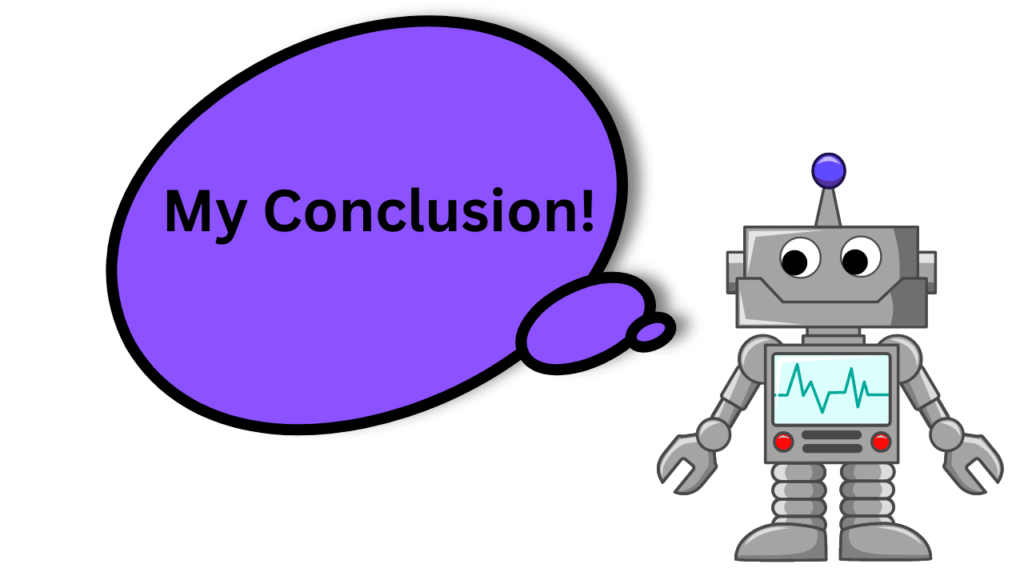
In my conclusion, the use of AI technology in mental health care is a rapidly growing field that has the potential to revolutionize the way we approach mental health treatment and support.
While there are many exciting opportunities for the use of AI in this context, there are also important considerations around the ethical, legal, and social implications of these technologies.
It is essential that we approach the use of AI in mental health care with caution and consideration, ensuring that it is implemented in a way that promotes equitable and effective care for all individuals, including those who are most vulnerable.
With continued research, development, and innovation, we can work towards harnessing the full potential of AI to improve mental health outcomes and support for individuals and communities across the globe.

